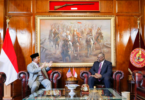Monitoring Desk
RAMALLAH: Palestinian President Mahmoud Abbas on Wednesday called for achieving inter-Palestinian reconciliation to face “risks” facing the Palestinian issue.
The call comes ahead of an expected announcement by U.S. President Donald Trump to relocate the U.S. embassy to Jerusalem and officially recognize the city as Israel’s capital.
“In order to ensure the success of reconciliation, we have instructed the government to go to the Gaza Strip and work to find solutions to the daily suffering of our people there,” Abbas said in a statement carried by the official Wafa news agency.
He appealed to the Palestinian people and factions to “focus on the upcoming challenges facing the national project by taking advantage of the opportunity to achieve national unity.”
He said the Palestinian unity is the “real response to all attempts aimed at violating our rights guaranteed by international law and norms”.
In October, rival Palestinian groups Hamas and Fatah signed a landmark reconciliation agreement in Cairo aimed at healing their decade-long rift after Hamas captured Gaza from Fatah in 2007 after days of street fighting. Meanwhile, hundreds of Palestinians demonstrated in the Gaza Strip on Wednesday against U.S. President Donald Trump’s plans to officially recognize Jerusalem as Israel’s capital.
Demonstrators waved banners condemning President Donald Trump’s expected decision on Wednesday to relocate the U.S. Embassy to Jerusalem and recognize the city as Israel’s capital.
“The Palestinian people will foil Trump schemes as they did for previous plans,” Hamas leader Salah al- Bardawil told participants in the rally. Emad al-Agha, a leader of Palestinian Presi-dent Mahmud Abbas’ Fatah group, called on Arab states to severe relations with Israel.
“We are here today to reiterate our rejection of U.S. decisions regarding Jerusalem,” he said, going on to call on Arab countries to pile pressure on Washington to reverse its plans on the holy city. He termed the U.S. move as a “total bias to the Israeli occupation”.






